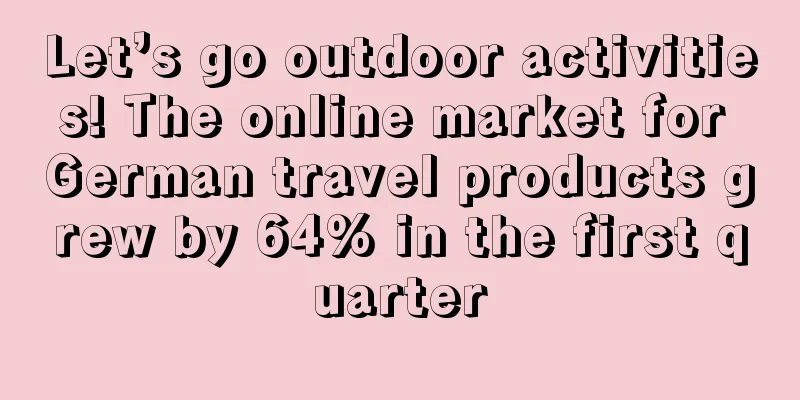Let’s go outdoor activities! The online market for German travel products grew by 64% in the first quarter

|
Since the Russia-Ukraine conflict, global economic development has been affected to varying degrees, and e-commerce sales in various countries have also slowed down significantly .
Recently, the German Federal E-Commerce Association Bevh released a report on the development of German e-commerce sales in the first quarter , which mainly compared the development of e-commerce sales after the start of the Russian-Ukrainian conflict on February 24. The report shows that from the beginning of January to the start of the Russian-Ukrainian conflict , online transactions for clothing and shoes increased by 10% year-on-year, while sales fell sharply by 8.6% after the conflict began , and the fashion category only grew by 3.2% in the first quarter .
The online growth trend of fashion categories has slowed down, similar to the trend of home products, which have always grown steadily . It is reported that the online sales growth rate of furniture was 13.9% before the Russian-Ukrainian conflict , and only increased by 0.3% after the conflict began . In the first quarter, the online sales of home products increased by 9% . Compared with the previous quarter, e-commerce sales increased by 23.7% , and increased by 2.3% compared with the same period last year .
After the start of the Russia-Ukraine conflict, pharmaceuticals reached a new high after the epidemic, with online sales increasing by 40% in the first quarter and sales of 407 million euros , an increase of 23.5% from 329 million euros in the first quarter of 2021 .
As the epidemic is gradually lifted, Germany's tourism industry is gradually recovering. In the first quarter, Germany's online tourism sales increased by 64.2% to 1.85 billion euros , compared with 1.13 billion euros in the same period last year , but still less than half of the first quarter of 2020 (3.89 billion euros). Before the Russian-Ukrainian conflict, online tourism sales almost doubled ( 93.3%), but fell back to 13.4% after the conflict began .
Driven by Christmas, German e-commerce sales grew 11.5% in the fourth quarter of 2021, with revenue reaching 21 billion euros . In the first quarter of 2022 , German consumer e-commerce sales were approximately 22.8 billion euros, up 8.2% from the previous quarter .
Although the growth of German e-commerce sales has slowed down suddenly due to the conflict between Russia and Ukraine, consumers will face high consumption due to factors such as inflation crisis, supply chain problems and raw material costs. To break this spending crisis, online shopping will attract more attention from consumers. Sellers can continue to wait and see the market and make preparations for product selection. Germany E-commerce travel |
<<: Bicycle market is booming, and related accessories are selling well
>>: Japan's April website traffic rankings released! Amazon visits declined
Recommend
What is flywheel? flywheel Review, Features
Flywheel Data was founded as a value-added reselle...
What is Smile Direct Club? Smile Direct Club Review, Features
Smile Direct Club is a direct-to-consumer orthodo...
Vipshop recruits operations staff with a monthly salary of 40K and increases investment in independent websites!
Globally, the clothing industry has become a red ...
Another strict investigation! A large number of seller accounts have been suspended
Soon after the beginning of the year, Amazon laun...
In February, online sales in the UK increased by 69.5% year-on-year, and the footwear industry has great potential for development
It is reported that online retail sales in the UK...
2021 Global E-commerce Market Data: The United States has dropped to pre-epidemic levels!
The world economy is still affected by the epidem...
Amazon updates multiple fees, effective as early as next month
It is less than a month away from the arrival of ...
Search volume soared 28236%, Etsy home products ushered in a big boom
The 2020 epidemic has prompted more consumers to ...
Etsy freezes some seller accounts due to tax updates!
Recently, Etsy announced that they must check or ...
Big news! South Korean e-commerce giant Naver and retail giant Shinsegae form a "250 billion" alliance
Since last year, there have been rumors in the Ko...
Latest news! A group of Amazon sellers are expected to get back their frozen funds
Last month, the news that "a big seller in S...
What is PAPA data? PAPA data review, features
PAPA Data is committed to unified integrated manag...
Cross-border giants are transforming and no longer selling goods?
“Did you make money in 2023?” This is a questionn...
What is Hangzhou Yunban Technology Co., Ltd.? Hangzhou Yunban Technology Co., Ltd. Review, Features
Hangzhou Yunban Technology Co., Ltd. was founded ...
What is Agility GIL? Agility GIL Review, Features
Agility GIL is a global transport and logistics p...









